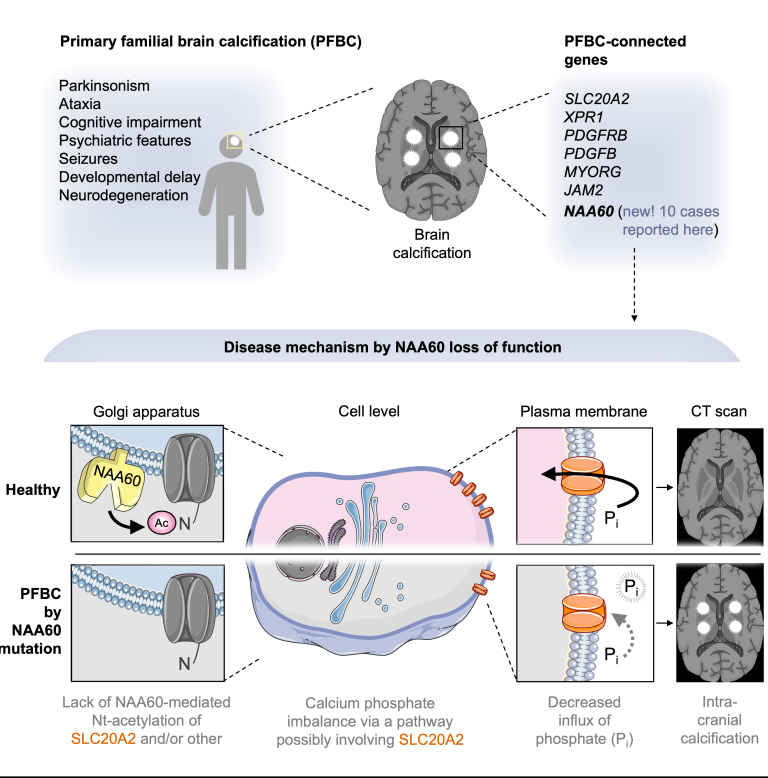Study reveals potential breakthrough in understanding brain disorder linked to calcium build-up
13 March 2024
A global collaborative study led Dr Viorica Chelban and Professor Henry Houlden (UCL Queen Square Institute of Neurology) identifies a new gene linked to a rare neurological condition called Primary Familial Brain Calcification.

Primary Familial Brain Calcification (PFBC) is characterised by abnormal accumulation of calcium deposits in the brain and leads to a range of debilitating symptoms, including movement disorders, mood changes, and cognitive decline. Despite its impact, the underlying causes of PFBC are largely unknown, with approximately half of familial and sporadic cases going undiagnosed.
In the study, published in Nature Communications, the researchers identified a new disease gene, NAA60, in 10 patients from seven unrelated autosomal recessive families with PFBC.
This gene affects a protein that in turn impacts the behaviour and function of other proteins in the brain, such as their stability, interaction with other molecules or where they go in the cell. However, the impact on human physiology has yet to be established. Using advanced genetics, biochemical, enzymatic and imaging techniques, the researchers found that variants in this gene cause loss-of-function, resulting in impairment of NAA60 and other proteins that rely on it for proper functioning.
Significantly the study uncovered a significant association between NAA60 and the phosphate importer SLC20A2. Dysfunction in NAA60 led to reduced levels of SLC20A2 at the cell membrane, leading to a build-up of phosphate in the extracellular environment and an abnormal calcium phosphate homeostasis, which in turn results in brain calcification.
In addition to shedding light on PFBC, these findings may have broader implications for understanding common neurodegenerative diseases. Brain calcifications similar to those in PFBC are also found in more common conditions such as Down syndrome, Parkinson's disease and Alzheimer's disease, as well as in the ageing process itself with around 20% of elderly people developing brain calcification.

Professor Houlden said: "This study not only enhances our understanding of PFBC and gives us a better understanding of what's happening inside the brain of someone with this disorder, but also provides valuable insights into the broader landscape of neurodegenerative conditions. It's like discovering a missing puzzle piece in unravelling the complex mechanisms underlying brain calcification disorders."
The UCL researchers are based in the Neurogenetics lab at the Queen Square Institute of Neurology and collaborated with 60 academics from across the world, as well as multiple rare disease consortia, in the study.
Dr Chelban, principal investigator on this study, added: "This work exemplifies the power of global cooperation in discovering the mysteries of rare disorders. By providing a biochemical explanation of the disease-causing mechanisms of the NAA60 gene, this study identifies a fundamental process for healthy neurobiological functioning which can contribute to the development of targeted treatments for PFBC as well as a range of neurodegenerative diseases in the future. By pooling our expertise and resources we can accelerate progress towards targeted treatments for PFBC, related conditions and have a better understanding of the role of calcification in aging itself."
Related
- Read the paper in Nature Communications
- Dr Viorica Chelban’s academic profile
- Professor Henry Houlden’s academic profile
- Dr Reza Maroofian’s academic profile
- Dr Rauan Kaiyrzhanov’s academic profile
- Professor Nick Wood's academic profile
- UCL Queen Square Institute of Neurology
Photo by Anna Shvets on Pexels
 Close
Close

